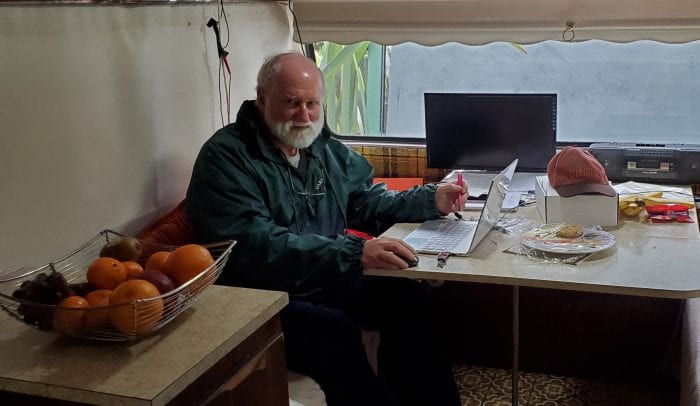SBU professor and wife weather coronavirus crisis in New Zealand

The ultimate in remote teaching: 9,000 miles from the classroom
By Daniel Dunaief
Halfway between where they grew up and their home in Stony Brook, Malcolm and Waveney Bowman had a choice to make: venture back northeast to New York, which was in the midst of a growing coronavirus crisis or return southwest to New Zealand, where the borders were quickly closing.
The couple chose New Zealand, where their extended family told them not to dare visit. The Do Not Enter sign wasn’t as inhospitable as it sounded.
Malcolm Bowman, a Distinguished Service Professor at Stony Brook University’s School of Marine and Atmospheric Sciences, recognized that he could continue to teach three courses from a great distance, even a camper on a small stretch of land in the northwest part of the Coromandel Peninsula in New Zealand.
“We could be anywhere on the planet,” Malcolm suggested to his wife. “Why don’t we see if we can set up camp?”
Climbing aboard the last plane out of Honolulu before New Zealand closed its borders, the Bowmans didn’t have much of a welcoming party when they arrived at the airport. Their family told them, “We love you, but you can’t come anywhere near us,” Malcolm recalled. “Coming from the states, you could be infected.”
If his family took the American couple in, they would have had to report the contact, which would have forced Waveney’s brother and his wife, Derek and Judy Olsson, into personal isolation for two weeks.
Derek filled the trunk of an old car with food and left the key under the front tire. The Stony Brook couple set up a temporary living space in two campers on a small piece of land in the middle of the night, where they have been living for over a month. All told, their 235 square feet of living space is about 12% of the size of their Long Island home.
The country has been in lockdown, where people are practicing social distancing and are limiting their non-essential outings.
Malcolm realized he had to “rise to the challenge” which, in his case, literally meant climbing out of his bed at all hours of the morning. New Zealand is 16 hours ahead of New York, which means that he had to be awake and coherent at 2 a.m. on Tuesday morning in New Zealand to teach a course that meets at 10 a.m. on Monday morning on Long Island.
With a cell tower up the hill behind their camper, the Bowmans could access the internet. While they had shelter, they still needed electricity. Fortunately, Malcolm’s brother Chris, who is an engineer, provided solar panels to generate electricity.
Living south of the equator means the Bowmans are heading into winter in New Zealand, where the days are shorter and the sun is lower in the sky, which makes the solar panels that provide electricity less effective. Malcolm describes the biggest challenges as the “time difference and mosquitoes.”
In a typical day, the professor rises at 4 a.m. or earlier local time to teach his classes, participate in online seminars, attend University Senate and other committee meetings, continue his research and take care of his students, all through Google Meet and Zoom. He co-teaches Physics for Environmental Studies, Contemporary Environmental Issues and Polices and Advanced Coastal Physical Oceanography.
Malcolm’s favorite part of the day occurs at sunrise, when the cloud formations over Mercury Bay serve as a canvas for the colorful red and orange rays of the sun that herald the start of another day down under.
He recognizes that he and his wife’s current indefinite time in New Zealand provides them with a comfortable connection to the land of his youth, where he can enjoy some of the beaches that have made the country famous and hear the sounds of flightless birds near his camper home.
Given the focus on work early in the day, Malcolm can choose his activities in the afternoon, which include catching up on emails, reading the New York Times, cleaning up the campsite and fishing for the evening’s meal.
Even from a distance of almost 9,000 miles from New York, the Bowmans agonize with their neighbors and community members in the Empire State.
“It’s very difficult watching all the suffering, sickness, death, inadequate availability of life-saving equipment, the enormous stress health care workers are under and the loss of income for many families,” Bowman explained in an email. “Our eldest daughter Gail is a medical worker at the Peconic Bay Medical Center in Riverhead so she is fighting at the front line. Very exhausting work.”
The Bowmans, who are naturalized American citizens, have no idea when international flights will resume from New Zealand.
A retired elementary school teacher who taught at the Laurel Hill School in Setauket for 34 years, Waveney wears a mask when she visits a large supermarket that is 12 miles away once a week. Malcolm, who also goes to the supermarket, said the store only allows one family member per visit.
As New Zealand natives, the Bowmans can live in the country indefinitely, but their intention is to return to Stony Brook as soon as possible.
Even though the shorter daylight hours and rainy days lower the amount of power the Bowmans can collect from their solar panels, the couple loves the outdoors. They have camped with their four children during summers in the hills of New Hampshire and Vermont and have both been involved with scouting activities, which emphasizes self sufficiency and living close to nature.
As a former amateur radio enthusiast, Malcolm is also adept at setting up communication systems in remote settings. He offers a message of hope to Long Islanders, “You can weather this storm. If possible, work and stay home and stay isolated.”
The Bowmans have followed the advice of the 37-year old Prime Minister of New Zealand, Jacinda Ardern, who urges people to “be especially kind to each other.”
All photos courtesy of Malcolm Bowman






